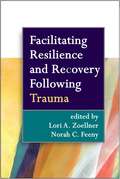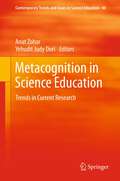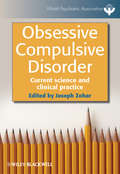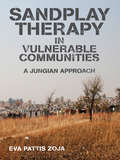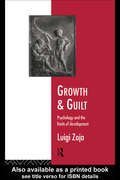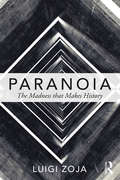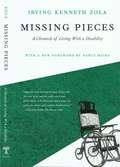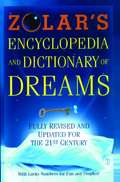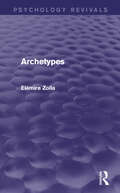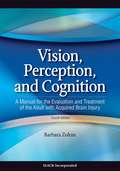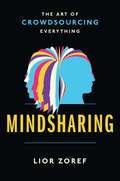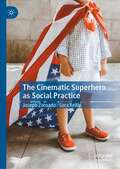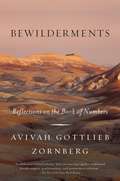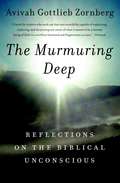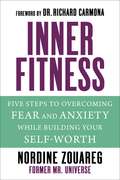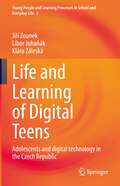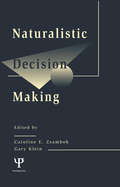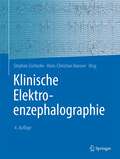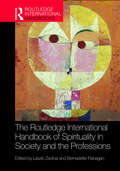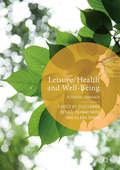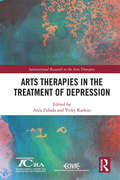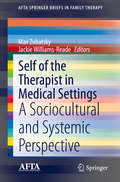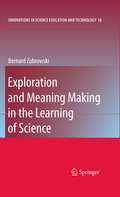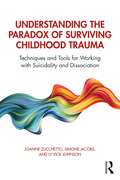- Table View
- List View
Facilitating Resilience and Recovery Following Trauma
by Lori A. Zoellner Norah C. FeenyThis volume synthesizes cutting-edge research on natural processes of resilience and recovery, highlighting implications for trauma treatment and prevention. Prominent experts examine what enables many trauma survivors to heal over time without intervention, as well what causes others to develop long-term psychiatric problems. Identifying key, modifiable risk and resilience factors--such as cognitions and beliefs, avoidance, pain, and social support--the book provides recommendations for when (and when not) to intervene to promote recovery. Illustrative case examples are included. A section on specific populations discusses children, military personnel, and low socioeconomic status or marginalized communities.
Metacognition in Science Education
by Anat Zohar Yehudit Judy DoriWhy is metacognition gaining recognition, both in education generally and in science learning in particular? What does metacognition contribute to the theory and practice of science learning? Metacognition in Science Education discusses emerging topics at the intersection of metacognition with the teaching and learning of science concepts, and with higher order thinking more generally. The book provides readers with a background on metacognition and analyses the latest developments in the field. It also gives an account of best-practice methodology. Expanding on the theoretical underpinnings of metacognition, and written by world leaders in metacognitive research, the chapters present cutting-edge studies on how various forms of metacognitive instruction enhance understanding and thinking in science classrooms. The editors strive for conceptual coherency in the various definitions of metacognition that appear in the book, and show that the study of metacognition is not an end in itself. Rather, it is integral to other important constructs, such as self-regulation, literacy, the teaching of thinking strategies, motivation, meta-strategies, conceptual understanding, reflection, and critical thinking. The book testifies to a growing recognition of the potential value of metacognition to science learning. It will motivate science educators in different educational contexts to incorporate this topic into their ongoing research and practice.
Obsessive Compulsive Disorder
by Joseph ZoharA clear summary of what is known about a highly prevalent and debilitating disorder that affects nearly as many people as does asthma. Expert authors review the biological basis for the disorder and describe both pharmacological and psychological approaches to treatment.
Sandplay Therapy in Vulnerable Communities: A Jungian Approach
by Eva Pattis ZojaSandplay Therapy in Vulnerable Communities offers a new method of therapeutic care for people in acute crisis situations such as natural disasters and war, as well as the long-term care of children and adults in areas of social adversity including slums, refugee camps and high-density urban areas. This book provides detailed case studies of work carried out in South Africa, China and Colombia and combines practical discussions of expressive sandwork projects with brief overviews of their sociohistoric background. Further topics covered include: the social aspect of psychoanalysis the importance of play pictographic writing and the psyche. Providing the reader with clear, practical instructions for carrying out their own sandwork project, this book will be essential reading not only for psychotherapists involved with sandplay therapy but also for those with an interest in cross cultural psychotherapy, as well as all professionals working with those in situations of social adversity.
Growth and Guilt: Psychology and the Limits of Development
by Luigi ZojaThe relentless exploitation of the earth's resources and technologys boundless growth are a matter of urgent concern. When did this race towards the limitless begin? The Greeks, who shaped the basis of Western thinking, lived in mortal fear of humanity's hidden hunger for the infinite and referred to it as hubris, the one true sin in their moral code. Whoever desired or possessed too much was implacably punished by nemesis, yet the Greeks themselves were to pioneer an unprecedented level of ambition that began to reverse that tabu. If it is true that no culture can truly repudiate its origins, and that gods who are no longer potent can vanish but still leave behind a body of myth which coninues to live and assert itself in modernized garb, then our concern with the limits of growth reflects something more than an awareness of new technological problems - it also brings to light a psychic wound a a feeling of guilt which are infinitely more ancient.
Paranoia: The madness that makes history
by Luigi ZojaLuigi Zoja presents an insightful analysis of the use and misuse of paranoia throughout history and in contemporary society. Zoja combines history with depth psychology, contemporary politics and tragic literature, resulting in a clear and balanced analysis presented with rare clarity. The devastating impact of paranoia on societies is explored in detail. Focusing on the contagious aspects of paranoia and its infectious, self-replicating dynamics, Zoja takes such diverse examples as Ajax and George W. Bush, Cain and the American Holocaust, Hitler, Stalin and Othello to illustrate his argument. He reconstructs the emblematic arguments that paranoia has promoted in Western history and examines how the power of the modern media and mass communication has affected how it spreads. Paranoia clearly examines how leaders lose control of their influence, how the collective unconscious acquires an autonomous life and how seductive its effects can be - more so than any political, religious or ideological discourse. This gripping study will be essential reading for depth and analytical psychologists, and academics and students of history, cultural studies, psychology, classical studies, literary studies, anthropology and sociology.
Missing Pieces: A Chronicle of Living With a Disability
by Irving Kenneth Zolahe personal odyssey of a man with a disability, this passionate book tries to tell as well as analyze what it is like to have a disability in a world that values vigor and health. Zola writes, "Missing Pieces is an unraveling of a social problem in the manner of Black Like Me. Like its author, I, too, am a trained social observer, but for me 'passing' was not an issue. For I already have the stigmata of the disable - the braces, the limp, the cane - though I have spent much of my life denying their existence." The author started out in the role of a social scientist on a seven-day excursion to acquaint himself with an extraordinary experiment in living - Het Dorp, one of the few places in the world designed to promote "the optimum happiness" of those with severe physical disabilities. Neither a medial center nor a nursing home, Het Dorp is a village in the western-most part of the Netherlands. What began as a sociological attempt to describe this unusual setting became, through the author's growing awareness, what can only be called a socio-autobiography. Resuming his prior dependence on a wheelchair, the author experienced his own transformation from someone who is "normal" and "valid" to someone who is "invalid." The routine of Het Dorp became his: he lived in an architecturally modified home, visited the workshops, and shared meals, social events, conversation, and perceptions with the remarkably diverse residents. The author confronts some rarely discussed issues - the self-image of a person with a chronic disability, how one fills one's time, how one deals with authority and dependence, and love and sex. Missing Pieces offers striking insights into an aspect of the human condition shared by nearly 30 million Americans. It is must reading for the general reader, as well as for the rehabilitation counselor, social worker, or social scientist. Author note: Irving Kenneth Zola (1935-1994) was Professor of Sociology at Brandeis University and a founding member and counselor at the Boston Self-Help Center. Nancy Mairs is the author of seven books, including Waist-High in the World: A Life Among the Disabled, and most recently, A Troubled Guest: Life and Death Stories. She lives in Tucson with her husband, George.
Zolar's Encyclopedia and Dictionary of Dreams
by ZolarThe completely revised and updated edition of the classic, best-selling guide to dream interpretation In the first major revision of the encyclopedia that has sold half a million copies worldwide, Zolar, the acclaimed "Dean of Astrology" (The New Yorker), has created the indispensable bedside reference for today's dreamers, reflecting the changes that have affected our waking hours and inevitably influence the content and significance of the messages we receive while we sleep. Looking at new cultural trends, work and social patterns, technologies and means of communication, Zolar reveals the meanings of dreams about cell phones, computers, cyberspace, beepers and much more. His concise and incisive explanations of such classic dreams as meeting a redheaded stranger, flying without wings and trying to comfort a crying baby are here as well, while obsolete subjects -- like girdles, gleaners and grenadiers -- have been eliminated. To complement each dream category a lucky number has been added for this new edition. With interpretations for more than 20,000 dreams, Zolar's Encyclopedia and Dictionary of Dreams offers you the opportunity to uncover the secrets hidden in your dreams and to act on the wisdom -- or respond to the warnings -- they contain.
Archetypes (Psychology Revivals)
by Elémire ZollaMan is dominated by his archetypes; they mould not only his history but his dreams. But how are we to define and evaluate them? Is it perhaps possible for us to relate more creatively to them? Originally published in 1981, these are some of the questions raised by this title. To answer them the author gathered together a vast amount of material drawn from Eastern and Western traditions, from science, literature, art and poetry. The answers he puts forward are often highly original and will surely challenge many of our most cherished patterns of thought. There emerges from this book what can only be described as a global metaphysical system, yet the author’s language is not that of an ordinary metaphysical treatise, and what he writes offered new challenge and hope to those suffering from the despair and cynicism engendered by a great deal in modern society at the time. Zolla does not, however, advocate a return to earlier historical patterns, nor is he proposing a new Utopia, but rather offers us a brilliant series of lessons in the art of centring. In the words of Bernard Wall, writing in the Times Literary Supplement, Zolla’s ‘deep, polymathic probing of the terms of human existence makes it sensible to compare him with Simone Weil, while some of his conclusions about ultimate mysteries – expressed in signs, symbols and sacraments, the sense of which we have lost – will make us think of the later T. S. Eliot’.
Vision, Perception, and Cognition: A Manual for the Evaluation and Treatment of the Adult with Acquired Brain Injury
by Barbara ZoltanVision Perception and Cognition, Fourth Edition is a concisely structured text that expertly addresses clinical reasoning and decision making for the entire evaluation and treatment process of the adult with acquired brain injury. Provided are theoretical information, guidelines for both static and dynamic assessment, information on specific standardized evaluations, guidelines for adaptive and restorative treatment based on described theoretical and evidence-based information, and information on environmental impact of client performance.
Studies in Emotion and Social Interaction: From Self to Social Relationships
by Van Zomeren MartijnWhat is it that moves and motivates us in our lives? Martijn van Zomeren proposes social relationships are at the essence of this key question and, in a fascinating investigation into human motivation, he develops a novel and integrative psychological theory termed 'selvations theory'. The theory suggests that we are essentially relational beings that seek to regulate relationships in response to felt changes in our network of relationships (selvations). However, we need to do this in culturally appropriate ways and this is where our culturally construed self comes to be of use. From Self to Social Relationships constitutes a powerful argument about human essence, integrating major theories in and around psychology, which has strong implications for the study and practice of social motivation.
Mindsharing
by Lior ZorefWhether we need to make better financial choices, find the love of our life, or transform our career, crowdsourcing is the key to making quicker, wiser, more objective decisions. But few of us even come close to tapping the full potential of our online personal networks. Lior Zoref offers proven guidelines for applying what he calls "mind sharing" in new ways. For instance, he shows how a mother's Facebook update saved the life of a four-year-old boy, and how a manager used LinkedIn to create a year's worth of market research in less than a day. Zoref's clients are using his techniques to innovate and problem-solve in record time. Now he reveals how crowdsourcing has the ability to supercharge our thinking and upgrade every aspect of our lives.
The Cinematic Superhero as Social Practice
by Joseph Zornado Sara ReillyThis book analyzes the cinematic superhero as social practice. The study’s critical context brings together psychoanalysis and restorative and reflective nostalgia as a way of understanding the ideological function of superhero fantasy. It explores the origins of cinematic superhero fantasy from antecedents in myth and religion, to twentieth-century comic book, to the cinematic breakthrough with Superman (1978). The authors then focus on Spider-Man as reflective response to Superman’s restorative nostalgia, and read MCU’s overarching narrative from Iron Man to End Game in terms of the concurrent social, political, and environmental conditions as a world in crisis. Zornado and Reilly take up Wonder Woman and Black Panther as self-conscious attempts to reflect on gender and race in restorative superhero fantasy, and explore Christopher Nolan’s Dark Knight trilogy as a meditation on the need for authoritarian fascism. The book concludes with Logan, Wonder Woman 1984, and Amazon Prime’s The Boys as distinctly reflective fantasy narratives critical of the superhero fantasy phenomenon.
Bewilderments
by Avivah Gottlieb ZornbergThe newest book in Avivah Gottlieb Zornberg's award-winning series of commentaries on the hebrew bible. The book of Numbers is the narrative of a great failure. What should have been for the Israelites a brief journey from Mount Sinai to the Holy Land becomes a forty-year death march. Both before and after the devastating report of the Spies, the narrative centers on the people's desire to return to Egypt, to undo the miraculous work of the Exodus. At its heart are speeches of complaint and lament, expressing a profound existential skepticism. But by contrast, in the narrative of the book of Numbers that is found in mystical and Hasidic sources, the generation of the wilderness emerges as one of extraordinary spiritual experience, receivers of the Torah to the fullest extent, fed on miracles and nurtured directly by God: a generation of ecstatic faith, human partners in an unprecedented conversation with the Deity. Drawing on kabbalistic sources, the Hasidic commentators on the book of Numbers depict a people who transcend prudent considerations in order to follow God into the wilderness, where their spiritual yearning comes to full expression. This view of the wilderness history invites us into a different kind of listening to the many cries of distrust, lament, and resentment that issue from the Israelites throughout the book of Numbers. Is there a way to integrate this narrative of dark murmurings, of obsessive fantasies of return to Egypt, with the celebration of a love-intoxicated wilderness discourse? The question touches not only on the language the Israelites speak but also on the very nature of human utterance. Who are these people? Who are we who listen to them? What effect does the cumulative trauma of slavery, the miracles of Exodus, the revelation at Sinai, have on a nation that is beginning to speak? In Bewilderments, one of the most admired biblical commentators at work today posits fascinating answers to these questions through the magnificent literary, scholarly, and psychological analysis of the text that is her trademark.From the Hardcover edition.
The Murmuring Deep: Reflections on the Biblical Unconscious
by Avivah Gottlieb ZornbergFrom one of the most innovative and acclaimed biblical commentators at work today, here is a revolutionary analysis of the intersection between religion and psychoanalysis in the stories of the men and women of the Bible. For centuries scholars and rabbis have wrestled with the biblical narrative, attempting to answer the questions that arise from a plain reading of the text. In The Murmuring Deep, Avivah Zornberg informs her literary analysis of the text with concepts drawn from Freud, Winnicott, Laplanche, and other psychoanalytic thinkers to give us a new understanding of the desires and motivations of the men and women whose stories form the basis of the Bible. Through close readings of the biblical and midrashic texts, Zornberg makes a powerful argument for the idea that the creators of the midrashic commentary, the medieval rabbinic commentators, and the Hassidic commentators were themselves on some level aware of the complex interplay between conscious and unconscious levels of experience and used this knowledge in their interpretations. In her analysis of the stories of Adam and Eve, Noah, Jonah, Abraham, Rebecca, Isaac, Joseph and his brothers, Ruth, and Esther-how they communicated with the world around them, with God, and with the various parts of their selves-Zornberg offers fascinating insights into the interaction between consciousness and unconsciousness. In discussing why God has to "seduce" Adam into entering the Garden of Eden or why Jonah thinks he can hide from God by getting on a ship, Zornberg enhances our appreciation of the Bible as the foundational text in our quest to understand what it means to be human.From the Hardcover edition.
InnerFitness: Five Steps to Overcoming Fear and Anxiety While Building Your Self-Worth
by Nordine ZouaregThe goal to improving one's life begins internally. By addressing the quality of your mental state—whether fear, doubt, anxiety, depression—you can achieve a positive self-worth and improve your quality of life. It all begins with you! All of us, at one point in our lives, have wondered if we are able to make the decisions or choices that will turn our lives around. Can I begin that work project I have been putting off? What about the diet that will help me lose weight and get healthy? Can I salvage the marriage that&’s ripping at the seams? What do I do after losing my job? The hardest part can be taking that first step toward such a goal, and the fear can be overpowering. That is the goal of InnerFitness. Former Mr. Universe, Nordine Zouareg, learned that while his outer self was chiseled out of stone, his inner self was crumbling. Rather than giving up, Nordine looked back on his life and actively reflected on the emotions that affected who he had become. From that point forward, his goal was not only to improve the quality of his life, but that of others. During such self-exploration, he noted five key issues to personal improvement. They are: self-worthtrusttranquilitybodydesire to fight By exposing these five basic issues which hold us back, Nordine shows how to be empowered, have emotional clarity, and consistently choose freedom over fear, success over self-sabotage, confidence over insecurity, and courage over passivity. In essence, retraining your brain from &“I&’m not enough&” to &“I&’m good enough.&”InnerFitness explains how to manage your inner voice—the one which tells us we&’re not good enough, that we cannot succeed. By taking such steps, like celebrating victories (large or small) and seeing failures only as temporary and instructional, you will be on a path to loving yourself for who you are…which is the first step to a happier life.
Life and Learning of Digital Teens: Adolescents and digital technology in the Czech Republic (Young People and Learning Processes in School and Everyday Life #6)
by Jiří Zounek Libor Juhaňák Klára ZáleskáThis book describes and explains how digital technologies enter adolescents’ everyday life and learning in different contexts and environments. The book is based on research conducted in recent years in the Czech Republic, the results of which are set within a broad theoretical and international framework.The authors consider the theoretical and methodological anchoring of the topic, describing various approaches in an effort to comprehensively describe and understand the learning process of today’s pupils. They focus on ways to explore learning in the digital era, domestication of digital technology in families, and parents' approaches to digital technology. Attention is paid to adolescents’ competences and autonomy in the use of digital technologies, as well as their views on technology in their lives and learning. The authors summarize the most important results of the research, but also consider the options of empirical research and their own experience with the research of such a complex concept.
Naturalistic Decision Making (Expertise: Research and Applications Series)
by Caroline E. Zsambok Gary KleinIf you aren't using the term naturalistic decision making, or NDM, you soon will be. Even as a very young field, NDM has already had far-reaching applications in areas as diverse as management, aviation, health care, nuclear power, military command and control, corporate teamwork, and manufacturing. Put simply, NDM is the way people use their experience to make decisions in the context of a job or task. Of particular interest to NDM researchers are the effects of high-stake consequences, shifting goals, incomplete information, time pressure, uncertainty, and other conditions that are present in most of today's work places and that add to the complexity of decision making. Applications of NDM research findings target decision aids and training that help people in their decision-making processes. This book reports the findings of top NDM researchers, as well as many of their current applications. In addition, the book offers a historical perspective on the emergence of this new paradigm, describes recent theoretical and methodological advancements, and points to future developments. It was written for people interested in decision making research and applications relative to a diverse array of work settings and products such as human-computer interfaces, decision support systems, individual and team training, product designs, and organizational development and planning.
Klinische Elektroenzephalographie
by Stephan Zschocke Hans-Christian HansenDie Autoren beschreiben in dem Band die physiologischen und pathophysiologischen Grundlagen der Elektroenzephalographie (EEG) und machen die Technologie Schritt für Schritt verständlich: Behandelt werden die EEG-Potenziale in ihren verschiedenen Formen sowie der Einsatz der EEG in der Intensivmedizin. Das Werk hilft Ärzten, brauchbare Kurven zu gewinnen, Befunde zu verstehen und zu interpretieren, aber auch Fehler zu vermeiden. Die 3., aktualisierte und überarbeitete Auflage enthält ein neues Kapitel über die EEG in der Neuropädiatrie.
The Routledge International Handbook of Spirituality in Society and the Professions (Routledge International Handbooks)
by Laszlo Zsolnai Bernadette FlanaganIncreasingly, it is being recognized that spirituality, defined here as "a multiform search for a transcendent meaning of life that connects them to all living beings and brings them in touch with God or ‘Ultimate Reality,’" is an aspect of almost every sphere and aspect of social life. It appears in humanity’s dealings with nature, home and community, healing, economics and business, knowledge, and education. The Routledge International Handbook of Spirituality in Society and the Professions is a stimulating collection that summarizes the most important issues, frameworks, discussions, and problems relating to spiritually inspired activities in different fields of social life. The contributors explore how spirituality is a part of existence and present approaches and models for professionals working in diverse areas. Presented in seven parts, the book provides a full overview of current research and practice. Part II, "Facets of spirituality," explores topics including philosophy, psychology, theology, and culture. Part III, "Nature," looks at ecology, agriculture, cities, and tourism. Part IV, "Home and community," presents chapters on various life stages, disability, gender, and culture. Part V, "Healing," examines medicine, mental and physical health, and ill-health. In Part VI, "Economy, politics, and law," contributors discuss business, leadership and the workplace, peace, and policing. Part VII, "Knowledge and education," includes chapters on science, design, fashion, literature, and the arts. In the final part, "Way forward," the editors look to the future with a chapter on inter-spirituality and the renewal of social practices. Driven by contemporary research and new developments, this Handbook is an innovative and interdisciplinary collection that provides an essential overview of contemporary spirituality and society from an international selection of contributors. The Routledge International Handbook of Spirituality in Society and the Professions offers accessible, diverse, and engaging international research, and its scope will appeal to academics and students of a wide range of subjects, including aging and addiction, psychology, theology, religious studies, sociology, business studies, and philosophy. It will also be an important work for professionals in medical and social services, the clergy, education, business, the arts, religious communities, and politics, and members of organizations looking at the links between spirituality, religion, and society.
Leisure, Health and Well-Being: A Holistic Approach (Leisure Studies in a Global Era)
by Zsuzsanna Benkő, Ishwar Modi and Klára TarkóThis book explores health and leisure as a holistic phenomenon with individual and social dimensions. Contributors to this edited volume explore the physical, mental, emotional, sexual and social aspects of health and leisure as well as the influence of moral and religious principles. The connections between the individual and the social structure, social integration, the social division of labor, and the natural environment are also analysed.The volume studies this relationship from a range of disciplinary backgrounds, including sociology, psychology, psychiatry, medical sciences, sport sciences, education, policy making, and from both national and international perspectives. As such, the collection will be of interest to scholars and students across a range of disciplines, including Leisure Studies, Health Studies, Health Promotion, Psychology and Mental Health, Sociology and Sport Studies.
Arts Therapies in the Treatment of Depression (International Research in the Arts Therapies)
by Ania Zubala Vicky KarkouArts Therapies in the Treatment of Depression is a comprehensive compilation of expert knowledge on arts therapies’ potential in successfully addressing depression. The book identifies ways of addressing the condition in therapy sessions, shares experience of tools and approaches which seem to work best and guides towards a conscious and confident evidence-based practice. Including contributions from international experts in the field of arts therapies, the book presents some of the most recent, high-profile and methodologically diverse research, whether in the form of clinical trials, surveys or case studies. The three sections of this volume correspond to particular life stages and explore major topics in arts therapies practice and the nature of depression in children, adults and in later life. Individual chapters within the three sections represent all four arts therapies disciplines. The book hopes to improve existing arts therapies practice and research, by encouraging researchers to use creativity in designing meaningful research projects and empowering practitioners to use evidence creatively for the benefit of their clients and the discipline. Arts Therapies in the Treatment of Depression is an essential resource for arts therapies researchers, practitioners and arts therapists in training. It should also be of interest to other health researchers and health professionals, particularly those who work with clients experiencing depression and in multidisciplinary teams.
Self of the Therapist in Medical Settings: A Sociocultural and Systemic Perspective (AFTA SpringerBriefs in Family Therapy)
by Max Zubatsky Jackie Williams-ReadeThis brief explores how the “person” of the therapist is developed when training and working in medical settings. It highlights important and often unspoken topics such as the personal, professional, cultural, ethical, and competency dilemmas new clinicians regularly face. The brief also addresses how personal experience with illness, death, cultural differences, and stigma may impact professionals in everyday practice. Topics featured in this Brief include:Helpful tips and tricks for new professionals entering a medical setting for the first time.Working with patients who suffer from chronic and terminal illnesses.Sociocultural norms and values that are often present in a medical setting.A new framework for identifying and treating professional burnout.How to handle ethical situations in medical organizations. Self of the Therapist in Medical Settings is a must-have resource for clinicians, professionals, supervisors, and faculty working in medical settings.
Exploration and Meaning Making in the Learning of Science
by Bernard ZubrowskiThis book provides a broad and deep rationale for various pedagogical practices associated with the teaching of science. The main thesis of this book is that the exploratory phase of scientific inquiry is undervalued and its purpose misunderstood. Furthermore, there is a need for an expanded conception or alternative way of thinking about the so called learning cycle that has been frequently cited as the pedagogical model for a fair number of curriculum programs. A pedagogical model is proposed that recognizes learning cycles as ones that build on each other in an in-depth developmental manner. It presents an alternative paradigm that gives more attention to the motivation of students and assigns an essential role for student input. The overall goal is to move the reader to think more holistically about the practice of science education. This original and unorthodox book summarizes the author's present thinking about curriculum design and direct work with students. The author draws upon his varied experiences to present a case for the importance of direct engagement with phenomena and materials. He argues that this practice is more than a matter of motivating students to become engaged in inquiry. The first four chapters lay out different levels of a pedagogical approach and an overall theoretical orientation. The middle chapters focus on what might be called sensory knowledge. These are concerned with the role of different sensory engagement, movement as related to gestural representation and the role of empathy in exploration. The last four chapters are about the role of aesthetic, play, variable exploration and metaphor in their shaping of science education experiences. Each chapter is introduced with a scenario or case study describing the behavior and talk of elementary or middle school students. The intention of these scenarios is to help the reader stay grounded while considering the more abstract development of research reports and broader philosophical issues.
Understanding the Paradox of Surviving Childhood Trauma: Techniques and Tools for Working with Suicidality and Dissociation
by Joanne Zucchetto Simone Jacobs Ly Vick JohnsonUnderstanding the Paradox of Surviving Childhood Trauma offers clinicians a new framework for understanding the symptoms and coping mechanisms displayed by survivors of childhood abuse. This approach considers how characteristics such as suicidality, self-harm, persistent depression, and anxiety can have roots in behaviors and beliefs that helped patients survive their trauma. This book provides practitioners with case examples, practical tips, and techniques for applying this mindset directly to their most complex cases. By depathologizing patients’ experiences and behaviors, and moving beyond simply managing them, therapists can reduce their clients’ shame and work collaboratively to understand the underlying message that these behaviors conceal.
